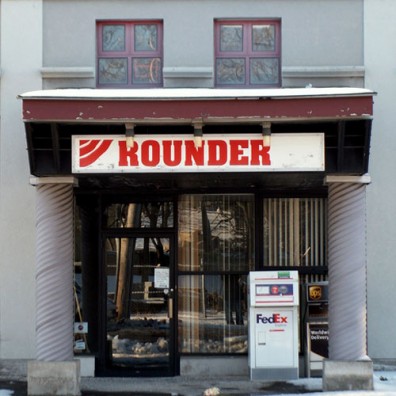Rounder: 40 Great Years Of Music
The Rounder Records Story: The 1990s By Geoffrey HimesEven in the late ‘80s, when Rounder was being deluged by submissions, Ken Irwin made it a point of honor to listen to every tape sent to the company. “If it was a nice day,” he recalls, “I’d sit on top of our garage with a hat, some water, a cassette player and my three-carbon memo pad where I could write, ‘Thank you for sending.’ One day I listened to a cassette from Classified Grass, a bluegrass group in Illinois. The first three songs were just sort of OK, and I might have ejected the tape. But it was nice out, so I listened to the fourth song and that changed everything.”
The fourth song featured a lead vocal by the band’s 13-year-old fiddler and her soprano’s piercing purity and feeling immediately grabbed his attention. Her name was Alison Krauss; she played fiddle in two different bands but was the lead singer in neither. Within a week Irwin had obtained another tape with Krauss singing five lead vocals. A short while later he called Krauss at her home in Urbana, Illinois, and said, “I have two pieces of news for you. First, you’ve been booked for the Newport Folk Festival.” “What’s that?” the young girl asked. Irwin explained and plowed on, “Second, we want to do your record.” Finally Krauss lost her composure and started shouting, “Mother! Mother!”
Irwin may have seen her all along as a singer, but her early publicity stressed her victories at assorted fiddle championships and one of her first tours was the National Council for the Arts’ 1988 Fiddle Tour with Kenny Baker, Michael Doucet, and Joe Cormier. The critics spotted her true potential, though; in a review of her 1987 debut album, Too Late To Cry, the Washington Post cited Krauss’s “lovely, expressive country voice; … it’s as if Nanci Griffith could back up her vocals with fiddle solos.” As she continued to release albums for Rounder, both as a solo artist and as leader of the Union Station bluegrass band, the emphasis shifted more and more to her singing. “I still love playing the fiddle,” she claimed, “but it’s amazing what a song lyric can do. When someone tells you, ‘That song is my life,’ you understand how important vocals are.”
As important as her fiddling and singing were, Krauss was just as important as a talent scout for new bluegrass songwriters - John Pennell, Nelson Mandrell, Sidney Cox, Ron Block, R.L. Castleman, and Mark Simos -reinvigorating a field that had suffered from a lack of strong new material. “There are a lot of songs I won’t sing, because they’re so predictable,” she explained. “You know what the next line is before the singer sings it or you know what the whole song is about after the first line. Or there’s a word that sticks out, and you say, ‘I can’t sing that.’ When you come across a songwriter like John or Sidney, who’s so fresh and believable, it’s like finding a gold mine.” Krauss was so taken with Sidney Cox’s whole family, a bluegrass-gospel band from Louisiana, that she ended up producing four of their albums. I Know Who Holds Tomorrow was credited to Alison Krauss & the Cox Family because of her lead vocals on hymns like Block’s “In the Palm of Your Hand.”
That song was part of a 1995 retrospective, Now That I’ve Found You, that collected one song apiece from Krauss’s five Rounder albums, her contributions to albums by Jerry Douglas and Tony Furtado, and her track on Keith Whitley: A Tribute Album. The three previously-unreleased songs included a spellbinding remake of “Baby, Now That I’ve Found You,” a 1967 hit for the pop-rock band the Foundations. That song broke into the top-50 on the country singles charts, and the Whitley song, “When You Say Nothing At All,” went to #3. The album as a whole hit #13 on the pop charts and #2 on the country charts and was eventually certified double-platinum (sales of two million or more). The title track won a Grammy and a CMA Award, just one of four CMA Awards she won that year, and Krauss was named Female Vocalist and Entertainer of the Year at the IBMA Awards. For Rounder, it was George Thorogood all over again. Every label in Nashville came sniffing around to see if they could lure Krauss away from Rounder, but she was adamant: “If it ain’t broke, why fix it?” If Rounder could give her double-platinum sales, complete artistic freedom, and a long-term commitment, how could another label improve on that?
Even more than J.D. Crowe had a decade earlier, Krauss nudged the emphasis in bluegrass from flashy picking and three-part harmonies to songwriter and lead singing, and one of the main beneficiaries was James King, a former singer from Ralph Stanley & the Clinch Mountain Boys. “Some people think the Stanley Brothers were morbid,” King said in 1999, “but I know how they got that way. They were raised up there on that mountain, Smith Mountain, and it gets lonesome up there. It’s a hard life; some folks die young; it’s a long ways between houses, and when that wind starts whistling across those mountaintops, it’s easy to sound morbid.” You can hear that whistling wind in King’s big, brawny voice, especially on his #1 bluegrass hit, “Bed by the Window,” a carefully-crafted story about two dying men. King still liked those three-part harmonies, though, and when he sang with the Johnson Mountain Boys’ Dudley Connell and the Lonesome River Band’s Don Rigsby at Doyle Lawson’s Bluegrass Festival, “the hairs stood up all over my head,” Irwin remembers. “Maybe that’s where I lost it all. But I knew I had to document those trio harmonies.” To do so he formed an all-star band called Longview, named after the studio where the three singers recorded songs like “High Lonesome,” which was both.
Krauss’s example led to a new emphasis on songwriting not just in bluegrass but in everything Rounder recorded, it seemed. Songwriting had always been the main reason for Philo Records’ existence, and after Rounder took over the label, Philo continued to attract some of the most literate musicians around. One of the best was New Hampshire’s Bill Morrissey, whose lyrics were so concise and evocative in their description and dialogue that it surprised no one when Knopf published his first novel, Edson, in 1996. But Morrissey could create equally memorable characters in the three minutes it took a song such as “Birches” to unfold. It tells you everything you need to know about a troubled marriage in a brief discussion about firewood. Another crucial discovery was Indiana’s Carrie Newcomer, who measured the balance between hope and despair in songs such as “Only One Shoe,” from her 1994 Philo debut, An Angel at My Shoulder.
Rounder had documented Texas’s blues and conjunto traditions in the ‘80s, but now the label turned toward the state’s equally important tradition of singer-songwriters such as Townes Van Zandt and Guy Clark. There were no heirs to that legacy worthier than the Flatlanders, a trio of friends from the West Texas cotton center of Lubbock, hometown to Buddy Holly and Waylon Jennings. Jimmie Dale Gilmore, Joe Ely, and Butch Hancock decided to form the Flatlanders after Ely picked up a hitch-hiking Van Zandt outside Lubbock and received an LP as a thank-you gift. The three friends set out to write songs as literate as Van Zandt’s but as vigorous as the records by Holly and Jennings. Rounder finally liberated the Flatlanders’ legendary, unreleased debut album and also issued two solo albums by Ely and two more by Gilmore, including One Endless Night, which was co-produced by Buddy Miller. Miller had his regular employer, Emmylou Harris, sing harmony on the title track in a voice as high and pure as Gilmore’s own. Tish Hinojosa managed to bridge the Texas traditions exemplified by Van Zandt and by Flaco Jimenez with Tex-Mex story songs such as “Something in the Rain,” which exposes the plight of migrant workers bombarded by pesticides.
Just up the Gulf Coast, in South Louisiana, Rounder continued to record Cajun artists such as guitarist D.L. Menard, accordionist Eddie LeJeune, Balfa Toujours, and Jo-El Sonnier. In 1992 Irwin created Le Trio Cadien by putting together guitarist Menard, accordionist LeJeune, and fiddler Ken Smith for an album of traditional two steps and waltzes such as “Valse de Kaplan.” Rounder was even busier in the zydeco realm where the label recorded Boozoo Chavis, Chris Ardoin, Nathan & the Zydeco Cha Chas, John Delafose, and his son Geno Delafose. But the biggest zydeco star of the ‘90s was Beau Jocque. “He was a giant man who made very rough, primitive music,” remembers producer Scott Billington, “but it turned out he was pretty sophisticated, as he transformed zydeco by bringing in influences of his favorite music by War, Santana and Earth, Wind & Fire. ‘Give Him Cornbread’ was a monster hit in South Louisiana; every radio station, even pop stations, were playing it. It had drummer Steve Charlot yelping in the background, and it had that huge Caribbean bottom to it. I said if we’re going to have that Caribbean rhythm, let’s mix it so everyone can feel it.”
Further east in Louisiana, Rounder continued to document the wild and wonderful permutations of New Orleans R&B. The city was willing to have a parade for any occasion, it seemed, and those parades always featured brass bands. But it took the Dirty Dozen Brass Band to prove that the format could handle modern jazz and soul numbers. The Dozen, who released a live album on Rounder, inspired dozens of local teenagers to pick up trumpets, tubas, saxophones, trombones, and snare drums to add funk and hip-hop flavors to the mix. The best of those young outfits was the ReBirth Brass Band, featuring a very young Kermit Ruffins before his solo success and stardom on TV’s Treme. ReBirth is represented here by their signature, sing-along party song, “Do Whatcha Wanna.” Another indigenous feature of many New Orleans parades and festivals are the Mardi Gras Indians, who seem to double in size when they pull on their hand-sewn suits of feathers and beads. They march through the streets, banging on hand percussion and chanting songs that have become New Orleans standards: “Iko Iko,” “Brother John,” and “Hey Pocky Way.” One of the most famous tribes is the Wild Magnolias, led by Big Chief Bo Dollis, who reworked Al Johnson’s 1960 Mardi Gras hit, “Carnival Time,” as an Indian tune. George Porter Jr., an original member of the legendary Meters before making a solo album for Rounder, played bass on the album.
The songs that New Orleans’ Irma Thomas recorded with producer Allen Toussaint in the early ‘60s were so striking that they were closely copied by Otis Redding (who turned “Rain in My Heart” into “Pain in My Heart”) and by the Rolling Stones (”Time Is on My Side”). Later in the ‘60s, New Orleans’ Johnny Adams, the “Tan Canary,” made similarly significant singles with the country-tinged “Release Me” and “Reconsider Me.” “When you bring into the studio singers who have made such an impression on American music, you have to ask yourself, ‘What do we do next?” admits producer Billington. “The secret, ultimately, comes down to the songs.” It was Brad Paul, Rounder’s head of promotion, who had the idea of putting Thomas together in the studio with two of her biggest fans, Marcia Ball and Tracy Nelson, after hearing the three singers harmonizing at a New Orleans club. Billington brought in quality songs, including “Sing It” by Louisiana songwriter David Egan, and the whole thing clicked. Billington also convinced Adams to devote a whole album to songs by Ray Charles’s favorite songwriter, Percy Mayfield, and another to the Brill Building’s resident bluesman, Doc Pomus. On Pomus’s “There Will Always Be One More Time,” Adams’ amazing tenor is backed by co-producer and keyboardist Dr. John and by guitarist Duke Robillard. “At the end of his life, Johnny stopped thinking of his voice as a hustle and he realized that people appreciated him as an artist,” Billington notes. “In all my years at Rounder, that may be the thing I’m most proud of.”
Robillard wasn’t the only roots-music star to emerge from Rhode Island’s Roomful of Blues. The band also produced guitarist Ronnie Earl (three solo albums on Rounder), saxophonist Greg Piccolo, singer Lou Ann Barton, singer Sugar Ray Norcia, and keyboardist Ron Levy (two solo albums on Rounder). The latter changed Rounder founder Marian Leighton into Marian Levy and became head of Rounder’s Bullseye imprint. But Roomful continued despite all those losses without losing its status as the top modern-day example of the jump-blues sound of Louis Jordan, Big Joe Turner, and Wynonie Harris. The band’s secret is its tight, punchy, four-man horn section, as one can hear on the 1996 recording, “Standing Here at the Crossroads.” Meanwhile Levy tackled the challenge of producing a new record for Charles Brown, who had been so good for so long that his 1945 hit “Driftin’ Blues” had inspired a young Ray Charles. Recently rediscovered by Bonnie Raitt, Brown needed a strong new record to take advantage of the renewed interest. “We didn’t want him to go in and just go over his sound from the ‘40s,” Marian Levy recalls. “We wanted to get him enthused again, and Ron found musicians good enough to get him excited.” The musicians on “A Virus Called the Blues” included Dr. John on organ and duet vocals.
Something similar happened when Billington produced a 1997album for Virginia’s Ruth Brown, “Miss Rhythm,” who had been Atlantic Records’ best-selling artist in the early ‘50s. Billington backed her with Robillard and four jazz musicians with ties to New Orleans’ Wynton Marsalis: drummer Herlin Riley, kid brother Delfeayo Marsalis, and saxophonists Victor Goines and Wes Anderson. It worked, for Brown seemed to recover her youth on a spirited version of Ivory Joe Hunter’s “False Friend Blues,” featuring guest guitarist Gatemouth Brown. Like Charles and Ruth Brown, Wilson Pickett was an R&B singer whose hits were all in his past when producer Jon Tiven took him into a New York studio in 1999. Tiven is a fine songwriter, though, and the band included Living Colour bassist Muzz Skillings and Highway 61 Revisited keyboardist Paul Griffin, and “It’s Harder Now” sparked one of “The Wicked Pickett’s” best late-career performances.
Being a gifted singer or instrumentalist is not enough to make a great record. Such a talent, whether it’s a 13 year-old fiddler from Illinois or a 69-year-old ex-star from Virginia, has to be linked with the right song and the right band. Lining up those three components just right can be elusive, but it became easier for Rounder as they expanded their songwriting contacts to include Sidney Cox, Bill Morrissey, Jimmie Dale Gilmore, David Egan, Doc Pomus, Charles Brown, and Jon Tiven. And it had been that young fiddler who had shown them the way.
|
|

Neil Cowley Trio |
LATEST GALLERY IMAGES

They Bombed A Playground 
More Death & Destruction |
|
|





